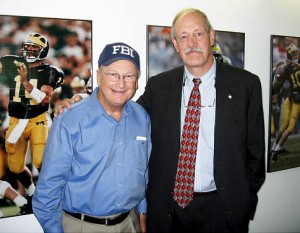Editors Note: The jury in the Bond’s case begins its fourth day of deliberations on Wednesday. He faces charges of making false statements to a grand jury about steroid use and obstruction of justice.
By WILLIAM C. RHODEN The New York TimesThe trial of Barry Bonds has always been more than a simple case of pursuing a bad guy and proving that he lied. The chase and the subsequent trial have been as much about a baseball era driven by vanity and greed, and fueled by performance-enhancing drugs.
But the eight-year pursuit of Bonds also reflects America’s discomfort with prominent, powerful, wealthy black men.
That might seem like an incredible statement to make in a nation that elected Barack Obama as its first black president. But Obama, who has had his citizenship questioned and has been heckled by a member of Congress, has a place among men including Jack Johnson, Paul Robeson, Muhammad Ali and Bonds.
In good conscience one could never put Bonds on par with Ali or Robeson and certainly not with the president of the United States.
Bonds’s historical antecedent is Jack Johnson, who became the first black heavyweight champion in 1908.
Johnson lived a fast, unapologetic lifestyle. He incensed some blacks and enraged many whites by openly keeping company exclusively with white prostitutes and marrying at least one.
To read more click here.
Ex-FBI Agent Responds to Column
Greg Stejskal served as an FBI agent for 31 years and retired as resident agent in charge of the Ann Arbor office. He writes a column for ticklethewire.com. Stejskal sent this response to William Rhoden and shared it with ticklethewire.com. The response below by Alan Gershel was also sent to Rhoden and shared with ticklethewire.com.

By Greg Stejskal
I generally agree with your premise about the prosecution of Barry Bonds as a misuse of money, but I think it’s a bit of a stretch to compare the Bonds prosecution to that of Jack Johnson.
If Bonds did lie to the Grand Jury, it is a felony and arguably the Grand Jury process would not be viable if witnesses were allowed to lie under oath with impunity.
There is precedent for such prosecutions of perjury in similar circumstances. In the Michigan Fab 5 case, only Chris Webber, of all the University of Michigan players who testified, lied about having received money from Eddie Martin. Those that admitted having received the money were not prosecuted. Webber was prosecuted for perjury and he ultimately pleaded to a felony.
In the FBI steroid case (Equine) I was involved in, we did not pursue users no matter whether they were high-profile athletes. We focused only on the dealers, but at the culmination of the case in 1994, I warned MLB (Major League Baseball) about the problem and was ignored.
I’ve often wondered if we shouldn’t have prosecuted some of the athletes. In the long run it might have avoided some of these problems.
Ex-Federal Prosecutor Alan Gershel Also Responds
Alan Gershel worked for the U.S. Attorney’s Office in Detroit for nearly 30 years, and was chief of the Criminal Division from 1989 to 2008. He is currently a full-time professor at the Thomas M. Cooley Law School in Auburn Hills, Mi.

By Alan Gershel
Dear Mr. Rhoden: as a former federal prosecutor, I read your article regarding the prosecution of Barry Bonds with great interest. You have stated that Barry Bonds was prosecuted for his “unlikability” and that the government’s effort”was a colossal misuse of time and money…”
You also seem to suggest that protecting a grand jury investigation is an “altruistic goal” not worth pursuing. I respectfully disagree. The prosecution of Barry Bonds is eminently justifiable.
A grand jury investigation is a search for the truth. Its success depends almost entirely on witnesses, who have been placed under oath and who are advised of the consequences should they fail to do so, telling the
truth. Perjurious testimony is an anathema to a search for the truth.
I am assuming we can agree that the nature and scope of the government’s investigation was a serious and legitimate one. If you do concur, then witnesses who may have information regarding the use of illegal performance enhancing drugs in Major League Baseball are legitimate witnesses. Once called and placed under oath, they cannot intentionally lie with impunity.This is what the prosecution is about.
It is not about the personality or race of Mr. Bonds. To have ignored his alleged false testimony, would have been giving Mr. Bonds favorable treatment because of his celebrity or the government’s fear of controversy. An unacceptable result, assuming there was sufficient evidence to prosecute.
Finally, an important deterrent message flows from a case of this nature that hopefully will have an impact on future investigations.





